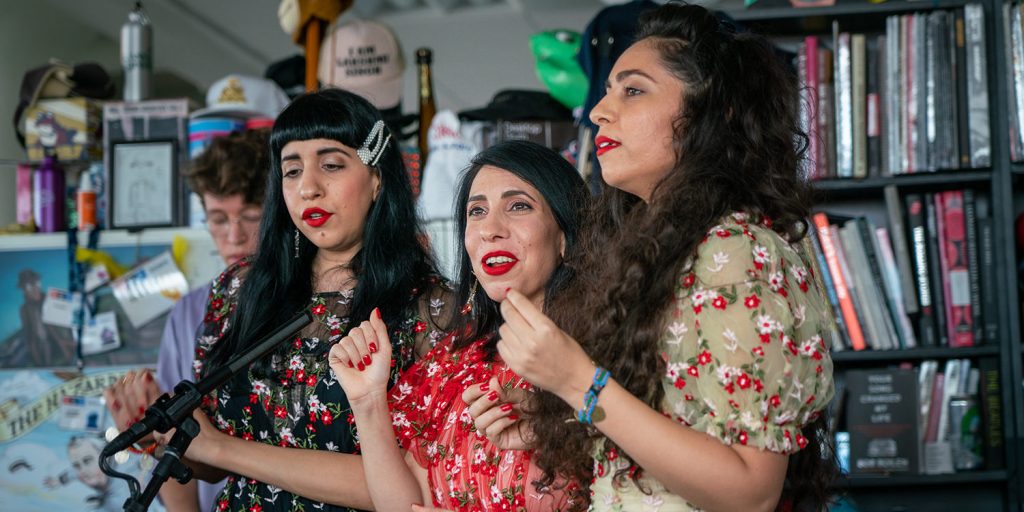It’s been several years since a trio of Israeli sisters burst onto the world music stage, grabbing the attention of fans across the globe with a unique sound that mixes the melodies of the sisters’ Yemenite Jewish heritage with electronic and hip hop beats, modernizing the music for a new generation.
The sisters – Tair, Liron, and Tagel Haim – form the band A-WA (pronounced “ay-wah” which means “yes” in colloquial Arabic) and they got their start singing old folk songs in Yemenite – a distinct dialect of Arabic spoken by Jews from Yemen – in the schoolyard of a tiny village in the Israeli Arava desert called Shaharut.
SEE ALSO:Israeli Singer Ninet Tayeb Rocks USA, NPR Compares Her To Joan Jett
For four years now, the sisters have been re-adapting these same folk songs into glorious three-part harmonies to a crowd of avid followers looking for something new and special.
Some of those followers gathered this week in the Washington DC offices of National Public Radio (NPR) to listen to the singers as they appeared on Tiny Desk Concerts, a series of intimate performances by respected musicians hosted by media personality Bob Boilen.
It was the sisters’ second encounter with NPR, which named the group one of the top 10 global music acts of 2015.
“The last time we filmed these three Israeli sisters, they were sitting in my hotel room during South by Southwest, performing a heartbreaking lullaby, accompanied by just a guitarist,” wrote Boilen of his previous interview with them in 2016. “Now Liron, Tagel and Tair Haim are behind my desk with a full band of keyboards, bass, guitar, and drums, singing more forlorn tunes in their unique three-part harmony.”
The Haim sisters
The Haim sisters’ first single Habib Galbi (“Love of My Heart”) soared to international attention shortly after it was first released in March 2015, going viral in Israel, Europe, several Arab countries and eventually North America.
It was the single they opened with on Tiny Desk on Tuesday and is the perfect example of A-WA’s style: taking an old Yemenite song and working in drums, bass, synthesizers, and guitar.
The siblings released a second album, Bayti Fi Rasi (My Home is in My Head) on May 31, 2019 and played some of these new songs on NPR as well.
The new album’s narrative focuses on the Haim sisters’ great-grandmother Rachel as she fled Yemen with her children, some of the 49,000 Yemenite Jews airlifted to Israel as part of the country’s historic Operation Magic Carpet. The operation brought Jews from Yemen, Djibouti, Eritrea, and Saudi Arabia to Israel between June 1949 and September 1950.
Sign up for our free weekly newsletter
Subscribe“The songs on this album are inspired by our great-grandma,” Tair tells NPR. “She was traveling from Yemen to Israel as a single mom and [“Hana Mash Hu Al Yaman” one of the songs on the album] talks about her arrival in Israel. They put all the Yemenite Jews back then in transition camps or a tent camp. … We talk about all the mixed emotions she felt.”
The Haim sisters themselves grew up in a family of six siblings, with a father of Yemenite Jewish origin and a mother of mixed Ukranian and Moroccan Jewish heritage. Shaharut, their tiny community in the far south of Israel, about 40 kilometers (25 miles) north of Eilat, had a population of 138 in 2018, according to the Israel Central Bureau of Statistics. Their paternal grandparents, born in Sana’a, Yemen’s capital, eventually settled in the Israeli city of Hadera, about 45 kilometers north of Tel Aviv. The sisters would spend weekends and holidays there listening to Jewish liturgy and folk songs in Yemenite.
All three sisters studied music, sang, danced, and performed from a young age. They grew up listening to music from around the world, including jazz, Motown, progressive rock, reggae, and 90s music, Tair told Rolling Stone in 2016.
“There were only 30 or so families in our village, and it was surrounded by kibbutzim settlements that made aliyah [immigrated to Israel] from the UK and the US. Our vocal teacher was American. She taught the three of us jazz standards and we were very inspired by Motown singers,” Tair told the magazine.
The songs the Haim sisters choose to sing are “folk songs, so a song structure would be like AAAAA — no choruses or introductions,” she explained. “So first we had to shorten them — they’re very long — without affecting the story. Then we’d maybe add an intro, like in ‘Habib Galbi.’ We added choruses to other songs. So we change it a lot but keep what I believe is most important: the language, dialect, and tribal singing.”
SEE ALSO: Pitbull Sinks Teeth Into Israel’s A-WA, New Yemenite Rap Remix Is Born
“We also added Motown and jazz harmonies, because in Yemen they sang in unison. The whole production is very electro and hip-hop,” Haim said.
In late 2016, A-WA caught the attention of Cuban-American rapper Pitbull, who sampled Habib Galbi for a remix that scored millions of hits on YouTube and iTunes.
To match their unique sound, the sisters also have a distinctive look. The siblings regularly don traditional Middle Eastern garb (Afghan glib dresses and jellabiyas) during performances, throwing in pops of color, neon headscarves, and oversized sunglasses.
American Vogue, the US high fashion magazine, took notice in 2016, writing, “Who are these three women in high top sneakers and djellabas, and where have they been all of our lives?”

Related posts

Rehabilitation Nation: Israeli Innovation On Road To Healing

Israeli High-Tech Sector 'Still Good' Despite Year Of War





Facebook comments